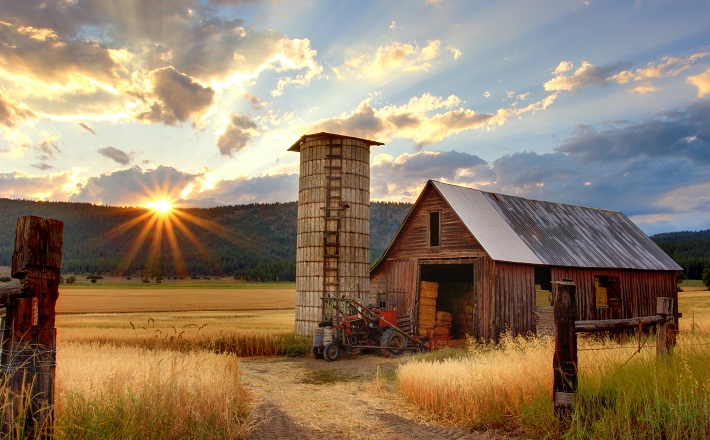If you’re a preacher who’s writing a sermon on harvest, or any sermon that includes agrarian images, here are three tips to keep in mind:
- Preach from what you know and how your experiences and relationships have shaped you to be. (Don’t pretend to be a farmer if you are not.)
- Become keenly aware of the naïve privilege from which you preach that your hearers may not enjoy.
- Exegete (that is, read closely) the agrarian text from the standpoint of the first hearers, who were nomads, sowers, farmers/landowners, peasant laborers, shepherds, gleaners, etc. But preach to your actual audience, regardless of where they are on the demographic spectrum.
My Grandpa Dick was a cattle farmer. He, Grandma Hester, and his sons ran a cattle farm that spanned three types of cattle operations: cow/calf, grower production, and finishing. Nowadays those operations are different farming operations altogether because it requires so much work and an immense amount of knowledge and experience.
Grandpa Dick died about fifteen years ago. His funeral was held at his rural congregation. Those in attendance were his family and his cattle farming neighbors, well dressed, but cowboys and cowgirls all around. The pastor officiating was considered a missionary. Small town congregations in cattle country have a tough time finding pastors. He was sent from Asia to shepherd this congregation.
Stick with what you know
This pastor preached Jesus and the resurrection; we all appreciated his attempt to “connect” the message with Grandpa Dick’s life. He talked about “the Good Shepherd” and how grandpa “knew the way of Jesus because he was a shepherd too.” We all understood his good intention. However, it was clear that this pastor knew little of farming or of farm family culture. See, grandpa was a master cattleman, but the hard work of family farming is not the crops or livestock. The hard part of farming is family. Some farm families do this better than others. Grandpa Dick, though we love him and miss him dearly, was not the greatest shepherd of his family. That reality was missing from the pastor’s message, yet hung heavy in the room over everyone gathered who knew better. The pastor would have done better just sticking with what he knew, speaking from his own knowledge and experience.
But is the harvest plentiful? Beware of your privilege
Jesus says in Matthew 9:37-38, “The harvest is plentiful, but the workers are few; therefore pray earnestly.” Any sermon on harvest could benefit from including this verse, right? Not exactly.
I am reminded of a session of confirmation. We were reading Luther’s Small Catechism and discussing the first article of the Apostles’ Creed. Luther explains that “God richly and daily provides all that is needed to support this body and life.” Immediately a student responds, “Lie! God does NOT provide everything people need. What about all the poor and hungry people?!”
“The harvest is plentiful” is not an image with which many people are familiar, whether it’s actual food, or metaphoric. The human condition is to operate from a perspective and chronic fear of scarcity, not plenty. So we must be careful not to preach from a place of privilege, espousing God’s abundant harvest, unaware that our hearers will not easily and immediately relate to the image of a plentiful harvest. And if we are honest with ourselves as preachers, we do not relate to that image either. Who of us operates out of an expectation that people will flood the doors of our congregations? Just as in farming, so in pastoring, the poorest crops or worst committee meetings take the hardest work and yield mostly loss and pain. You’ll do well, preacher, to avoid romanticizing the harvest, and to tell the truth instead. You know how to do this: preach through your experience of scarcity to bear witness to the harvest that looks like a cross.
You do not need to know farming to preach a sermon on harvest
Now we turn to faithful exegesis of these agrarian texts and their agrarian audiences. How do you preach on ag themes? Ask a farmer! Even better yet, visit a farm! If you do not know a farmer (but you do now; I always love a good chat) visit your preferred social media site. There are some great farmer content producers who are outstanding in their field (that’s a farm joke). Then preach to your hearers, whether they are agrarian or not. Here is just one example of a sermon on harvest:
The parable of the sower: The sower sows seed on all kinds of soil. A farmer I know, upon hearing this scripture, reacted without even thinking, “What a waste! Do you know how much seed costs!? On top of the seed, do you know how much time, labor, investment in machinery, fertilizer, and weed control farmers spend to prepare just the right type of soil for making the optimal seed bed!? Only a fool would so haphazardly fling seed everywhere. Only a fool would sow seed into soils that may or may not yield anything.”
What this farmer missed is that there is one more type of person that would do such a thing; a Sower who is SO rich, whose wealth is so abundant there there is no expense that is too high. No matter the soil, the Sower sows away. And God is no fool. The seeds are God’s limitless yet costliest cruciform grace. God will not stop sowing unto us even in our rockiest, hardest, shallowest days.

